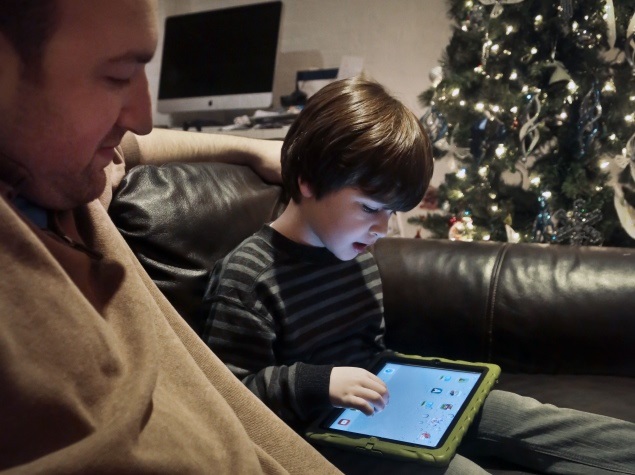- Home
- Science
- Science News
- Smartphones, Tablets and TVs Making Youth Emotionally Stunted: Study
Smartphones, Tablets and TVs Making Youth Emotionally Stunted: Study

Children's social skills may be declining as they have less time for face-to-face interaction due to their increased use of digital media, according to a University of California, Los Angeles study.
Scientists found that sixth-graders who went five days without even glancing at a smartphone, television or other digital screen did substantially better at reading human emotions than sixth-graders from the same school who continued to spend hours each day looking at their electronic devices.
"Decreased sensitivity to emotional cues - losing the ability to understand the emotions of other people - is one of the costs. The displacement of in-person social interaction by screen interaction seems to be reducing social skills," said Patricia Greenfield, a distinguished professor of psychology in the UCLA College and senior author of the study.
The psychologists studied two sets of sixth-graders from a Southern California public school: 51 who lived together for five days, and 54 others from the same school.
The camp doesn't allow students to use electronic devices - a policy that many students found to be challenging for the first couple of days. Most adapted quickly, however, according to camp counsellors.
At the beginning and end of the study, both groups of students were evaluated for their ability to recognise other people's emotions in photos and videos.
The students were shown 48 pictures of faces that were happy, sad, angry or scared, and asked to identify their feelings.
They also watched videos of actors interacting with one another and were instructed to describe the characters' emotions.
In one scene, students take a test and submit it to their teacher; one of the students is confident and excited, the other is anxious. In another scene, one student is saddened after being excluded from a conversation.
The children who had been at the camp improved significantly over the five days in their ability to read facial emotions and other non-verbal cues to emotion, compared with the students who continued to use their media devices.
"You can't learn non-verbal emotional cues from a screen in the way you can learn it from face-to-face communication," said lead author Yalda Uhls, a senior researcher with the UCLA's Children's Digital Media Centre, Los Angeles.
"If you're not practising face-to-face communication, you could be losing important social skills," said Uhls.
Uhls said that emoticons are a poor substitute for face-to-face communication: "We are social creatures. We need device-free time."
The research appears in the journal Computers in Human Behaviour.
For the latest tech news and reviews, follow Gadgets 360 on X, Facebook, WhatsApp, Threads and Google News. For the latest videos on gadgets and tech, subscribe to our YouTube channel. If you want to know everything about top influencers, follow our in-house Who'sThat360 on Instagram and YouTube.
Related Stories
- Galaxy S24 Series
- MWC 2024
- Apple Vision Pro
- Oneplus 12
- iPhone 14
- Apple iPhone 15
- OnePlus Nord CE 3 Lite 5G
- iPhone 13
- Xiaomi 14 Pro
- Oppo Find N3
- Tecno Spark Go (2023)
- Realme V30
- Best Phones Under 25000
- Samsung Galaxy S24 Series
- Cryptocurrency
- iQoo 12
- Samsung Galaxy S24 Ultra
- Giottus
- Samsung Galaxy Z Flip 5
- Apple 'Scary Fast'
- Housefull 5
- GoPro Hero 12 Black Review
- Invincible Season 2
- JioGlass
- HD Ready TV
- Laptop Under 50000
- Smartwatch Under 10000
- Latest Mobile Phones
- Compare Phones
- Oppo A1i
- Oppo A1s
- Motorola Edge 50 Ultra
- Leica Leitz Phone 3
- Moto G64 5G
- Moto G04s
- iQOO Z9 Turbo
- Vivo T3x 5G
- Asus ZenBook Duo 2024 (UX8406)
- Dell Inspiron 14 Plus
- Realme Pad 2 Wi-Fi
- Redmi Pad Pro
- Cult Shock X
- Fire-Boltt Oracle
- LG 65-inch 4K Ultra HD Smart LED TV 65UR7500PSC
- Xiaomi 32 Inch LED HD Ready Smart TV (L32M6-RA-L32M7-RA)
- Sony PlayStation 5 Slim Digital Edition
- Sony PlayStation 5 Slim
- Panasonic 1.5 Ton 5 Star Inverter Split AC (CS/CU-EU18AKY5X)
- Lloyd 1.5 Ton 3 Star Inverter Split AC (GLS18I3FWBEW)

















